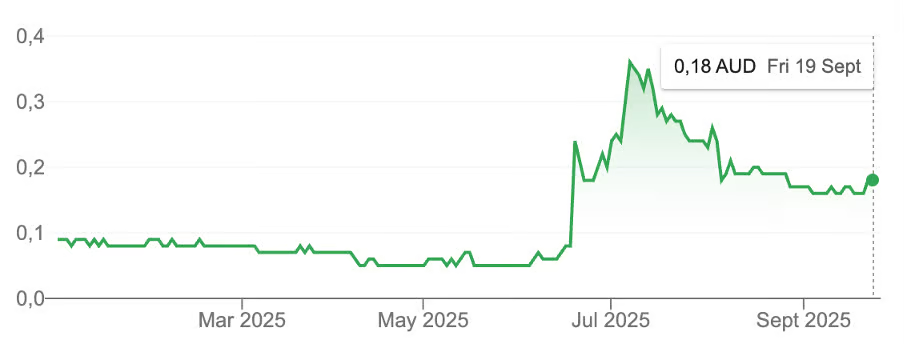Dear investors and well wishers,
The fund contracted 2% in September, which took us back to +79% for the calendar year-to-date.
I’m hosting a webinar next Monday at 11am Sydney time, register for access here and please send through any questions.
Rockets
Elon Musk, that political Rorshach test, has once again outdone himself by catching a falling rocket.
This saves all the weight associated with landing gear, and conveniently returns the booster to where it needs to be for its next mission.
Last week Elon also announced a Tesla taxi, a Tesla bus, and humanoid robots.

Remote controlled robots serving drinks
These robots are going to get very good, very fast.
Our world is built for humans, and a robot that does human tasks well should in theory be able to do manual jobs harder, faster, stronger, and longer than any of us. This may only be a few years away.
It raises interesting economic questions.
If you have robots being paid and spending money, does that count towards GDP?
Can growth then uncouple from (soon-to-be-shrinking) population?
And a question for the ages is how one person can lead so many companies executing across so many domains, literally including rocket science and brain surgery.

Markets
The last three months have been choppy. Risk management bailed us out of a number of positions, transferring what would have been substantial losses onto someone else’s balance sheet.
Managers have long-griped about the difficulty of trading in a market dominated by algos. And that was pre-ChatGPT. The situation today is significantly more severe.
Active fund managers used to underperform the market by 1-2% on average (to a first approximation they are the market, minus costs and fees).
But in recent years, firms like Citadel, which handles roughly a quarter of US equity volume, and quant shops like Jane Street, which hoover up the smartest Olympiad kids, have stripped additional fortunes out of the active management profit pool, like sharks feeding off an ever-shrinking pod of floundering, discretionary whales.
If you buy or sell a US equity, there’s a decent chance a Ken Griffin algo is on the other side.
This is the future, for better or worse.
From our side it’s been humbling to see how much these tools have improved our own decision-making, managing our largest wins, and protecting those gains when markets turned over the last few months.
Now, these same models are giving buy signals across the board, both in semiconductors, and for the first time in quite a while, software.


We hired Saurabh Bhatia as founding CTO in our venture studio to help build out our software capabilities. Saurabh has over 20 years experience at some of Australia’s leading startups, most recently at the development agency Paloma.
He has worked on Aussie household names like Afterpay, flatmates.com.au and Airtasker. And along with the venture studio work, is helping build out our internal tooling, some of which we will make available online.
Now that Alphasense, a slow, poorly designed platform, funded by ‘growth’ funds, has purchased and digested my two favourite platforms, Sentieo and Tegus, we will have to rely on our own tools more and more.
And if you want to build an MVP, or your own internal tooling, reach out and I’m sure Ace Venture can make it happen.
Open AI
OpenAI closed a round valuing the firm at US$157 billion.

There was interesting detail around their cost structure:

This gives roughly $1.3 billion of gross profits, subtracting Microsoft’s share and compute running costs from revenues.
Gross margins are not great - but in the company’s favour it almost certainly has serious unexplored pricing power.
ChatGPT offers significantly more value than software like Bloomberg or Salesforce, which charge around ~100x more. ChatGPT is only US$300 per year.
Underpricing a product and operating at a loss doesn’t always work (witness the various VC blow ups of recent years) but in this case it makes clear sense, helping make their tools as ubiquitous and indispensable to users as fast as possible.
Neoclouds
The rise of neoclouds is captivating the investment world. Companies like Coreweave and Lambda Labs have made major purchases of Nvidia’s latest GPUs, backed by leasing contracts with the world’s largest tech companies.
By taking on balance sheet risk when others want to run costs through their expense lines, they’ve been some of the fastest growing companies in the market. But once contracts roll off, as owners of the equipment, the pricing risk is theirs.
Even Microsoft rents Nvidia GPU capacity from Coreweave, which then uses those long term contracts to buy GPUs from its own shareholder, Nvidia. Similarly, Oracle is leasing GPU capacity off Crusoe Energy to lease to Microsoft and OpenAI.
This circularity has attracted the attention of a certain kind of short-seller - and there’s likely truth to the criticism.
There is now a flowering of business models and creative finance. Venture Capital firms are even setting up their own GPU clusters, for exclusive (or at least priority) use by portfolio companies.
GPU rental costs are tracked online by aggregators like vast.ai, so we can see in realtime how the different clouds are faring:

Leasing rates and secondhand prices were real-time indicators of demand during prior GPU booms and busts, and I’m sure will play the same role this time around.
GPU rental prices are definitely going down, so there is clearly excess capacity being dumped on the market. Payback periods for H100s are now well over a year, so any buyers must take the risk on their future value.
GPUs last 4-5 years, but now that Nvidia has moved to an annual upgrade cycle, practical obsolescence will come faster. This excess capacity will make inference extremely cheap in coming years.

Excess capacity at the cost of speculators is great for the rest of us.
By some counts, inference is already 99% cheaper now than it was a year ago.
Finance is mindblowingly good at getting things built, even as speculators are periodically wiped out.

At least one question is now reasonably settle: only the largest companies will train foundational models.
But inference demand is continually being revised upwards. Inference compute on a singly queries could feasibly go up 10, 100, or 1000x from here.
To give one example of how much this might increase, instead of simply choosing the highest probability next token, language models could explore more and more of the possible answer space, like looking ahead a hundred moves or more instead of one.
And the greenfield opportunity in applications is unparallelled, perhaps since Salesforce and that generation of software companies built enormous businesses on databases.
Today, the vast majority of people and businesses don’t use LLMs, and we have not even begun the era of agents, which will be yet another step change increase in demand for compute.
Along with healthcare, semiconductors remains one of our highest conviction bets.
If the season changes, we’ll be using tight risk management to protect our portfolio. Best case scenario, we will rip another 4x out of the sector.
Michael
If you'd like to invest with us, you can access our investment portal and fund documentation through the button above.
Or simply reply to this email and we'll be in touch.
Disclaimer
The information in this note has been prepared and issued by Frazis Capital Partners Pty Ltd ABN 16 625 521 986 as a corporate authorised representative (CAR No. 1263393) of Frazis Capital Management Pty Ltd ABN 91 638 965 910 AFSL 521445. The Frazis Fund is open to wholesale investors only, as defined in the Corporations Act 2001 (Cth). The Company is not authorised to provide financial product advice to retail clients and information provided does not constitute financial product advice to retail clients.
The information provided is for general information purposes only, and does not take into account the personal circumstances or needs of investors. The Company and its directors or employees or associates will use their endeavours to ensure that the information is accurate as at the time of its publication. Notwithstanding this, the Company excludes any representation or warranty as to the accuracy, reliability, or completeness of the information contained on the company website and published documents.
The past results of the Company’s investment strategy do not necessarily guarantee the future performance or profitability of any investment strategies devised or suggested by the Company.
The Company, and its directors or employees or associates, do not guarantee the performance of any financial product or investment decision made in reliance of any material in this document. The Company does not accept any loss or liability which may be suffered by a reader of this document.




